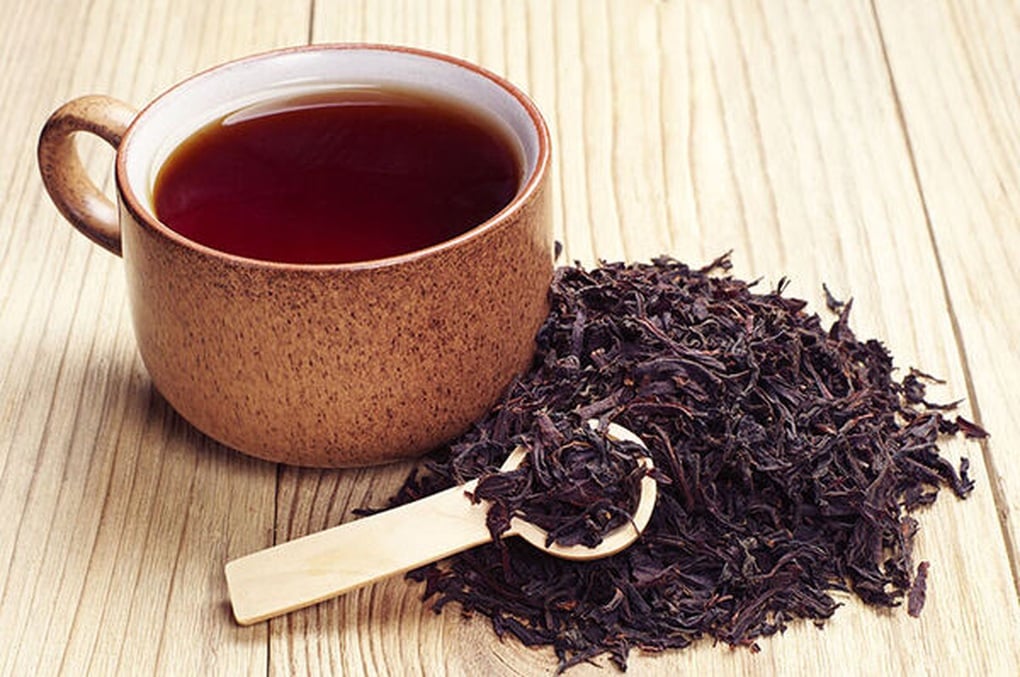Natural source of caffeine to replace coffee
According to American nutritionist Vandana Sheth, black tea is a great choice if you want to stay awake and focused without consuming too much caffeine like when drinking coffee.
The characteristic oxidation process gives the tea leaves a deep brown color, a strong flavor, and increased caffeine levels. An average 8-ounce cup of black tea contains about 47 mg of caffeine, but can go up to 90 mg, which is about the same amount of caffeine as a cup of coffee. However, black tea also has many outstanding health benefits.
Protect the heart, prolong life
Black tea has many health benefits (Photo: Getty).
Black tea contains a rich group of flavonoid antioxidants, which help lower blood pressure, reduce triglyceride levels, improve blood lipids and reduce the risk of obesity. In particular, theaflavin antioxidants in black tea have been shown to help reduce “bad” LDL cholesterol, preventing plaque buildup in the arteries.
This is the main cause of atherosclerosis, heart failure or stroke.
A large 2022 study of nearly 500,000 people found that those who drank at least two cups of black tea a day had a 9-13% lower risk of early death than those who did not drink it. This group was also less likely to die from heart disease or stroke.
Boost your brain, improve your mood
Thanks to its moderate caffeine content, black tea can improve alertness, reduce fatigue, and reduce the risk of depression. Not only that, black tea also contains L-theanine.
This is an amino acid that helps create a state of relaxation while maintaining concentration, stimulating the brain to secrete dopamine to help refresh the spirit without causing stress like high doses of caffeine.
Supports blood sugar control, prevents diabetes
Black tea contains many antioxidant and anti-inflammatory compounds that are formed during the oxidation of tea leaves. These compounds help improve insulin sensitivity, enhance pancreatic function, and positively impact the gut microbiota.
A 2019 review found that drinking black, green, or oolong tea may reduce the risk of developing diabetes or related complications.
Drinking black tea after meals can also slow the sudden rise in blood sugar.
Improve intestinal health, antibacterial
Black tea contains many polyphenols, a group of substances that can nourish beneficial bacteria and inhibit harmful bacteria in the intestines. In addition, black tea also has antibacterial properties, helping to destroy harmful agents in the digestive system, helping to maintain a healthy intestinal environment.
Reduces the risk of certain cancers
Thanks to its high content of antioxidant polyphenols, black tea can eliminate free radicals, which cause cell damage that leads to cancer.
Many studies have shown the potential of black tea in reducing the risk of cancers such as: gastrointestinal cancer, breast cancer, ovarian cancer, lung cancer and thyroid cancer.
In addition to its outstanding effects, black tea also helps improve bone density, reduce the risk of rheumatoid arthritis, increase concentration, improve mood and prevent Parkinson's disease.
Notes when using black tea
Although good for health, experts recommend drinking only a maximum of 3 cups of black tea per day, avoiding drinking close to bedtime to avoid insomnia, heart arrhythmia or headaches due to caffeine.
In particular, people at risk of kidney stones or chronic kidney disease should consult a doctor before regular use, because black tea contains a lot of oxalate, a substance that can crystallize and form kidney stones.
Source: https://dantri.com.vn/suc-khoe/chuyen-gia-my-chi-thuc-uong-tot-nhat-cho-tuoi-tho-viet-nam-rat-pho-bien-20250706215737927.htm






















![[Photo] Gia Lai provincial leaders offer flowers at Uncle Ho's Monument with the ethnic groups of the Central Highlands](https://vphoto.vietnam.vn/thumb/1200x675/vietnam/resource/IMAGE/2025/7/9/196438801da24b3cb6158d0501984818)













































































Comment (0)